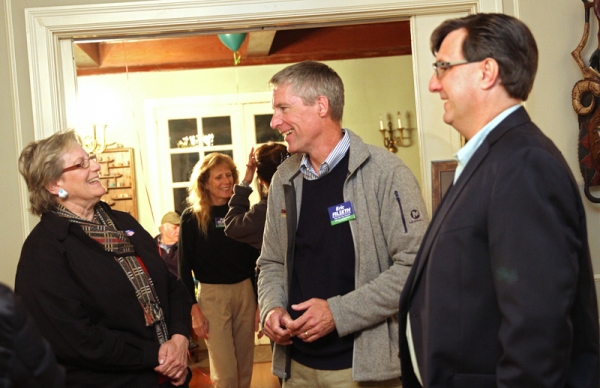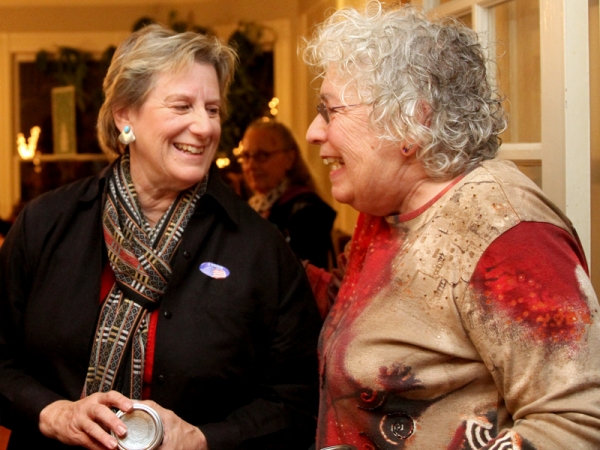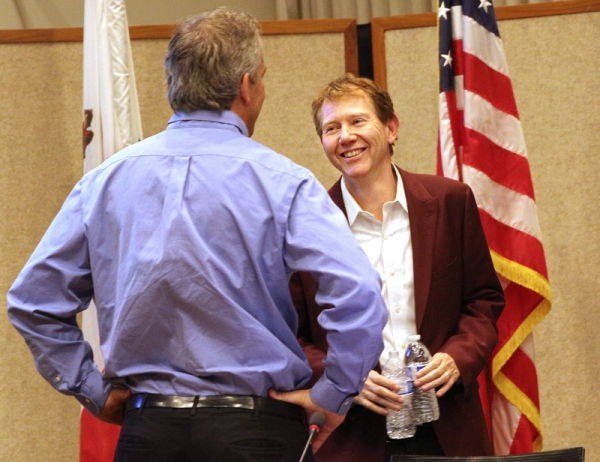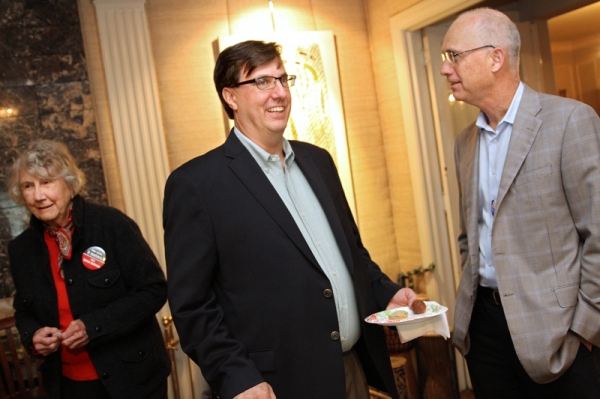In a sweeping victory for critics of recent development trends, Palo Alto voters elected on Tuesday three City Council candidates backed by a slow-growth citizens group, while a fourth "residentialist" candidate enjoyed a razor-thin lead in a race that on Wednesday was still too close to call.
Tom DuBois and Eric Filseth, two Midwest natives who became involved in Palo Alto politics last year out of frustration with the City Council's policies on growth and development both secured seats on the council, while incumbent Councilwoman and residentialist Karen Holman cruised to re-election victory with the most votes in a 12-candidate field. Councilman Greg Scharff, who was not backed by the citizens group, also coasted to a second term, but Mayor Nancy Shepherd fell short in her bid for re-election.
The race for the fifth seat was a dead heat as of Wednesday afternoon, with Lydia Kou and Cory Wolbach locked in a tight battle. While Wolbach, who is a legislative aide for state Sen. Jerry Hil, led by nearly a hundred votes on Tuesday night, Kou enjoyed a lead of 33 votes by Wednesday at 5 p.m., with hand-delivered absentee and provisional votes yet to be counted by the Santa Clara County Registrar of Voters.
Like DuBois and Filseth, Kou is affiliated with the group Palo Altans for Sensible Zoning, which formed last year in opposition to a housing development on Maybell Ave.
Election night was less jubilant for candidates backed by the city's political establishment. While Scharff easily won a second term, Shepherd and attorney A.C. Johnston finished seventh and eighth, according to early results. Each enjoyed a long list of endorsements from past mayors, commissioners, school trustees and community activists. Of the four candidates endorsed by "Palo Altans for Good Government," only Scharff emerged victorious, with Wolbach (who also enjoys broad establishment support) still awaiting the final vote count.
For the slow-growth proponents, Tuesday was a night of triumph. The evening culminated in victory speeches from all three candidates whose elections were all but secured shortly after 8 p.m., when results from mail-in ballots were released by Santa Clara County. Holman, who has been one of the council's leading critics of new developments, will have new council colleagues in January who share her skepticism. At a campaign party at the home of Janet Dafoe, Holman said she felt "gratified" and tired. She also said she flet "really like the people's voices have been heard."
"This is where the community has been for a number of years," Holman said, "but there hasn't been an issue that galvanized people to change the council majority."
In the future, she said, she wanted people's differences to "inspire us and inform us rather than divide us. I think it's a community that really needs to heal. We need to grow up and not pretend that everything is okay and just talk nicely about the issues.
"We need to actually recognize that it is a divided community and it's time to heal and bring people together and learn from our mistakes, learn from our differences and bring the community together."
Filseth, a retired semiconductor executive who grew up in Wisconsin and who now lives in Downtown North, called the results "a reality check" for the current council but said he wasn't too surprised.
"To me, the best part of the campaign is that when we talked to people, most of them agreed with us," Filseth said.
DuBois, a business consultant who grew up in Ohio and who now lives in Midtown, was upbeat and said that in terms of dollars per vote, "We did pretty well." His campaign revolved around increasing council efficiency, improving transparency and (along with the rest of the "residentialist" group) curbing the impacts of new development.
"I campaigned pretty clearly on these issues, and I see this as a mandate for me to govern on these issues," DuBois said of the early results.
Scharff, a local attorney who served as mayor last year, drew endorsements from a large group of past school trustees and council members, as well as well-known neighborhood leaders such as bicycle advocate Penny Ellson and environmentalist Walt Hays.
But even with the support from the broad political establishment, the incumbents had to withstand criticism from the community for not being as strident in their opposition to new developments as Holman and Schmid.
Scharff said the council has worked hard to address of all the issues that citizens had long been complaining about, particularly parking and traffic. The council "pivoted" after last year's Measure D election and has launched numerous initiatives to address these issues, he said. He finished third, just 28 votes behind DuBois, with provisional votes yet to be counted. Filseth finished fourth, 502 votes behind Scharff.
Scharff said he was "honored" to be re-elected.
Shepherd was more subdued after the early results came in showing her out of the top five spots. Shepherd told the Weekly she is proud of her accomplishments on the council, which she said help protect the community from high-speed rail and in helping to get the city "working well." She said she is "very grateful" for her time on the council and that she has worked hard to do what the public asked the council to do.
"I'm very grateful for the time I have spent on the City Council," Shepherd said. "I think there's clearly something that's not allowing people to see the activity that the City Council is doing."
Kou, whose team gathered at the Elks Lodge, said she was proud of her campaign, whatever happens.
"I'm very optimistic but more importantly I'm so proud of my campaign. No matter if I win or lose, the whole point is that so many people stepped up for me in the community. They believed in me."
Wolbach said Tuesday that he was proud of his campaign, which he said has "tried to exercise civil discourse."
"Win or lose, I feel we had a positive impact on the discourse, not only in tone, but in content," Wolbach said. "There's a need for the council to creatively find solutions to the jobs and housing imbalance that is recognized by all the candidates and it must be addressed by all on the council in a creative and collaborative way."
The 12-candidate field also included retired teacher John Fredrich, three-time candidate Mark Weiss, retired Boeing engineer Seelam Reddy and Ventura resident Wayne Douglass, whose campaign focused on bringing more focus to the issue of homelessness. All four trailed the rest of the field by a considerable margin.
Palo Alto voters were also overwhelmingly supporting Measure B, an increase in the city's hotel tax to fund infrastructure projects. More than 76 percent of the voters backed it. Measure D, which will reduce the council size from nine to seven seats effective in 2018 won by a smaller margin, with 54 percent of the votes supporting the measure.
Voter turnout in Palo Alto was about 36 percent Tuesday, with more than 13,000 registered voters participating.
Staff Writer Sue Dremann contributed to this report






Comments
another community
on Nov 5, 2014 at 10:02 am
on Nov 5, 2014 at 10:02 am
Earlier today there were numerous letters on this site about the editor's political bias and propensity to erase all comments and discussion of issues (albeit polite and respectful) that don't fit their conservative politics.
Those comments have all disappeared --- as will this one in a few minutes. Differences of opinion not allowed?
A free press ---nope.
Censorship shameful in the United States of America.
Registered user
online staff of Palo Alto Online
on Nov 5, 2014 at 11:01 am
Registered user
on Nov 5, 2014 at 11:01 am
@neighbor,
The comments you reference haven't been removed. They are on this thread: Web Link
Old Palo Alto
on Nov 5, 2014 at 11:42 am
on Nov 5, 2014 at 11:42 am
[Post removed.]